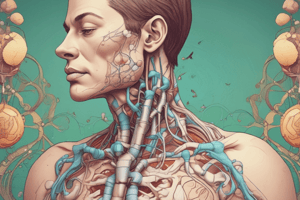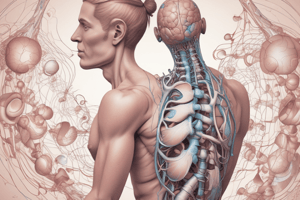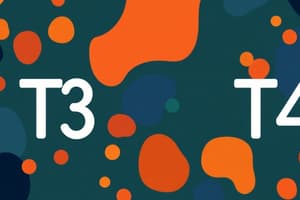Podcast
Questions and Answers
What is a primary symptom of hypercalcemia?
What is a primary symptom of hypercalcemia?
- Increased neuro muscular activity
- Inability to concentrate urine (correct)
- Severe bronchospasm
- Presence of carpopedal spasms
Which laboratory finding is indicative of hypoparathyroidism?
Which laboratory finding is indicative of hypoparathyroidism?
- Increased serum calcium levels
- Normal PTH levels
- Low alkaline phosphatase levels
- Increased serum phosphate levels (correct)
What complication can arise from nephrocalcinosis due to calcium deposition?
What complication can arise from nephrocalcinosis due to calcium deposition?
- Decreased risk of kidney stones
- Higher incidence of muscle weakness
- Decreased urine output
- Increased susceptibility to bladder infection (correct)
Which symptoms are characteristic of hypoparathyroidism?
Which symptoms are characteristic of hypoparathyroidism?
Which condition results from excess secretion of parathyroid hormone (PTH)?
Which condition results from excess secretion of parathyroid hormone (PTH)?
What treatment is typically utilized for hypercalcemia?
What treatment is typically utilized for hypercalcemia?
Which of the following is NOT a symptom of hypoparathyroidism?
Which of the following is NOT a symptom of hypoparathyroidism?
Which of these findings is typically observed in the diagnosis of hypercalcemia?
Which of these findings is typically observed in the diagnosis of hypercalcemia?
Which symptom is most commonly associated with hyperthyroidism?
Which symptom is most commonly associated with hyperthyroidism?
What role does Thyroid-Stimulating Hormone (TSH) play in the endocrine system?
What role does Thyroid-Stimulating Hormone (TSH) play in the endocrine system?
Which of the following is a sign of hypothyroidism?
Which of the following is a sign of hypothyroidism?
How is thyroid function typically evaluated?
How is thyroid function typically evaluated?
Which of the following correctly describes the relationship between T4 and T3?
Which of the following correctly describes the relationship between T4 and T3?
Which term describes the clinical syndrome resulting from exposure to high levels of circulating thyroid hormones?
Which term describes the clinical syndrome resulting from exposure to high levels of circulating thyroid hormones?
What is one common symptom of adrenal insufficiency?
What is one common symptom of adrenal insufficiency?
Which of the following is NOT a common symptom of hyperthyroidism?
Which of the following is NOT a common symptom of hyperthyroidism?
Which hormone is primarily responsible for regulating calcium homeostasis in the body?
Which hormone is primarily responsible for regulating calcium homeostasis in the body?
What is the major cause of Cushing's Syndrome?
What is the major cause of Cushing's Syndrome?
What is a common symptom of adrenal insufficiency?
What is a common symptom of adrenal insufficiency?
Which of the following best describes hyperparathyroidism?
Which of the following best describes hyperparathyroidism?
What physiological effect does thyroid hormone have on the heart?
What physiological effect does thyroid hormone have on the heart?
What is the primary function of calcitonin?
What is the primary function of calcitonin?
Which of the following is a symptom of hormonal disorders related to thyroid dysfunction?
Which of the following is a symptom of hormonal disorders related to thyroid dysfunction?
How does the body respond to low calcium levels?
How does the body respond to low calcium levels?
What percentage of circulating T3 comes from the deiodination of T4 in peripheral tissues?
What percentage of circulating T3 comes from the deiodination of T4 in peripheral tissues?
What is the recommended daily intake of iodine for adequate thyroid function?
What is the recommended daily intake of iodine for adequate thyroid function?
What is the primary regulatory mechanism for Thyroid-Stimulating Hormone (TSH) secretion?
What is the primary regulatory mechanism for Thyroid-Stimulating Hormone (TSH) secretion?
Which of the following conditions is primarily characterized by an excess of circulating thyroid hormones?
Which of the following conditions is primarily characterized by an excess of circulating thyroid hormones?
What is a common symptom associated with hyperthyroidism?
What is a common symptom associated with hyperthyroidism?
Which of the following signs is indicative of Graves' disease?
Which of the following signs is indicative of Graves' disease?
What differentiates hypothyroidism from hyperthyroidism?
What differentiates hypothyroidism from hyperthyroidism?
Which measurement is essential for evaluating thyroid function?
Which measurement is essential for evaluating thyroid function?
Which of the following describes a characteristic feature of hypothyroidism?
Which of the following describes a characteristic feature of hypothyroidism?
How does hyperthyroidism affect menstrual cycles in women?
How does hyperthyroidism affect menstrual cycles in women?
What is a notable characteristic symptom of acromegaly?
What is a notable characteristic symptom of acromegaly?
Which of the following conditions is most commonly associated with excess cortisol?
Which of the following conditions is most commonly associated with excess cortisol?
What is the normal range for I131 or I123 radio-active iodine uptake in diagnosing hyperthyroidism?
What is the normal range for I131 or I123 radio-active iodine uptake in diagnosing hyperthyroidism?
What is a common physical change in the hands of someone with acromegaly?
What is a common physical change in the hands of someone with acromegaly?
Which of the following statements about the adrenal gland is accurate?
Which of the following statements about the adrenal gland is accurate?
What is a potential complication of acromegaly related to joint health?
What is a potential complication of acromegaly related to joint health?
What is the primary cause of hyperplasia in the adrenal cortex?
What is the primary cause of hyperplasia in the adrenal cortex?
What symptom is associated with excessive growth hormone secretion in adults?
What symptom is associated with excessive growth hormone secretion in adults?
Which hormone primarily influences cellular metabolism across various tissues?
Which hormone primarily influences cellular metabolism across various tissues?
What is the primary source of T3 in the bloodstream?
What is the primary source of T3 in the bloodstream?
Which plasma carrier protein binds the majority of circulating T4?
Which plasma carrier protein binds the majority of circulating T4?
What is the primary physiological effect of thyroid hormones on the heart?
What is the primary physiological effect of thyroid hormones on the heart?
Which process primarily regulates thyroid hormone production?
Which process primarily regulates thyroid hormone production?
How does thyroid hormone impact bone turnover?
How does thyroid hormone impact bone turnover?
What is the recommended minimum daily intake of iodine for proper thyroid function?
What is the recommended minimum daily intake of iodine for proper thyroid function?
Which of the following represents a critical effect of thyroid hormone on growth?
Which of the following represents a critical effect of thyroid hormone on growth?
What is the typical percentage of unbound T3 in the plasma?
What is the typical percentage of unbound T3 in the plasma?
What role does calcitonin play in calcium homeostasis?
What role does calcitonin play in calcium homeostasis?
What sign is most commonly associated with excess levels of cortisol due to adrenal malignancy?
What sign is most commonly associated with excess levels of cortisol due to adrenal malignancy?
Which of the following symptoms is indicative of adrenal gland hypofunction?
Which of the following symptoms is indicative of adrenal gland hypofunction?
What is a primary stimulus for the secretion of parathormone (PTH)?
What is a primary stimulus for the secretion of parathormone (PTH)?
Which of the following is a potential sign of hyperparathyroidism?
Which of the following is a potential sign of hyperparathyroidism?
What physiological condition can lead to thin, fragile skin and easy bruising?
What physiological condition can lead to thin, fragile skin and easy bruising?
In the context of adrenal gland dysfunction, which symptom is commonly associated with a secondary cause?
In the context of adrenal gland dysfunction, which symptom is commonly associated with a secondary cause?
What characteristic symptom might indicate an adrenal tumor causing excessive ACTH secretion?
What characteristic symptom might indicate an adrenal tumor causing excessive ACTH secretion?
Which of the following conditions is associated with hyperpigmentation of the skin?
Which of the following conditions is associated with hyperpigmentation of the skin?
What clinical manifestation is associated with interstitial nephritis linked to calcium deposition in renal tubules?
What clinical manifestation is associated with interstitial nephritis linked to calcium deposition in renal tubules?
Which diagnostic test is likely to show an increase in alkaline phosphatase in the presence of hypercalcemia?
Which diagnostic test is likely to show an increase in alkaline phosphatase in the presence of hypercalcemia?
Which condition is characterized by an increase in serum phosphate and a decrease in serum calcium?
Which condition is characterized by an increase in serum phosphate and a decrease in serum calcium?
What symptom is commonly associated with hypoparathyroidism due to low PTH levels?
What symptom is commonly associated with hypoparathyroidism due to low PTH levels?
Which process causes nephrocalcinosis in patients with hypercalcemia?
Which process causes nephrocalcinosis in patients with hypercalcemia?
What is a potential psychological manifestation of hypercalcemia?
What is a potential psychological manifestation of hypercalcemia?
What complication can arise from hypoparathyroidism involving neuromuscular activity?
What complication can arise from hypoparathyroidism involving neuromuscular activity?
What diagnostic marker indicates hypoparathyroidism when PTH is low?
What diagnostic marker indicates hypoparathyroidism when PTH is low?
Flashcards are hidden until you start studying
Study Notes
Thyroid Gland and Thyroid Hormones
- The thyroid gland's primary function is to secrete sufficient amounts of thyroid hormones, T4 and T3.
- Additionally, parafollicular cells secrete calcitonin, essential for calcium homeostasis.
- The functional units of the thyroid gland are called follicles.
- T4 is the primary secretory product of the thyroid gland, which is the sole source of T4.
- T3 is produced through two processes: 80% from T4 deiodination in peripheral tissues and 20% from direct thyroid secretion.
- Over 99% of circulating T4 and T3 bind to plasma carrier proteins, including thyroxine-binding globulin (TBG), transthyretin (TTR), and albumin.
- Only unbound (free) hormone exhibits metabolic activity and physiologic effects, comprising a small percentage of total hormone in plasma.
Thyroid Hormone Action
- Thyroid hormone plays a critical role in fetal brain and skeletal maturation.
- It increases basal metabolic rate, exerts inotropic and chronotropic effects on the heart, and enhances sensitivity to catecholamines.
- It stimulates gut motility, increases bone turnover, elevates serum glucose levels, and reduces serum cholesterol.
- T3 serves as a vital regulator of skeletal maturation at the growth plate, directly regulating factors and contributors to linear growth.
- It may participate in osteoblast differentiation and proliferation, along with chondrocyte maturation, leading to bone ossification.
Control of Thyroid Function
- The hypothalamic-pituitary-thyroid axis regulates thyroid hormone secretion, production, and growth.
- The hypothalamus releases TRH (Thyroid-releasing hormone), which stimulates the anterior pituitary to secrete TSH (Thyroid-stimulating hormone).
- TSH in turn stimulates the thyroid gland to produce and release thyroid hormones.
- This system operates through negative feedback, with T4 and T3 levels inhibiting TSH production and release.
Thyrotoxicosis & Hyperthyroidism
- Thyrotoxicosis is a clinical syndrome characterized by high levels of circulating thyroid hormones.
- It is often caused by hyperactivity of the thyroid gland, i.e., hyperthyroidism.
Hyperthyroid Symptoms
- Symptoms include palpitations, anxiety, sweating, weight loss, fatigue, increased appetite, tremors, heat intolerance, insomnia, diarrhea, and mood swings.
- Physical examination reveals hyperreflexia, tachycardia, systolic hypertension, and a fine tremor of outstretched hands, among other findings.
Hypothyroidism
- Hypothyroidism is a condition where the thyroid gland does not produce enough thyroid hormones.
- This leads to a decrease in metabolism and a variety of symptoms.
- Symptoms can vary depending on the severity of the hypothyroidism.
Hypothyroid Symptoms
- Symptoms include fatigue, weight gain, depression, constipation, cold intolerance, dry skin, dry hair, and difficulty concentrating.
- Hypothyroidism can also lead to goiter (enlargement of the thyroid gland), muscle weakness, and a slow heart rate.
Evaluation of Thyroid Function
- The evaluation of thyroid function typically includes measurement of:
- Total T4 (normal: 4 - 12 ug/dl)
- Total T3 (normal: 80-120 ng/dl)
Causes of Hyperthyroidism
- Hyperthyroidism can be caused by:
- Graves’ disease (most common cause)
- Thyroiditis (inflammation of the thyroid gland)
- Toxic nodular goiter (one or more nodules in the thyroid gland produce excessive hormone)
- Too much thyroid hormone treatment
- Rarely, tumors in the pituitary gland.
Causes of Hypothyroidism
- Hypothyroidism can be caused by:
- Hashimoto's thyroiditis (autoimmune disease that attacks the thyroid gland)
- Surgery to remove the thyroid gland
- Radiation therapy to the thyroid gland
- Certain medications, such as lithium
- Congenital hypothyroidism (present at birth)
Treatment of Hyperthyroidism
- Treatment options for hyperthyroidism typically include:
- Antithyroid medications
- Radioactive iodine therapy
- Surgery to remove the thyroid gland
Treatment of Hypothyroidism
- Treatment for hypothyroidism:
- Hormone replacement therapy (oral thyroid hormone medication)
- Adjusting dosage based on symptoms and blood tests
- Regular monitoring of thyroid function through blood tests.
Thyroid Gland
- Function: Secretion of thyroid hormones (T4 & T3) and calcitonin (calcium homeostasis).
- Follicles: Functional units of the thyroid gland.
- Thyroid hormones: T4 (thyroxine) and T3 (triiodothyronine) - required for cell homeostasis, differentiation, growth, and metabolism.
- Iodine sources: Seafood, bread, dairy products, iodized salt, and supplements - recommended intake is 150 mcg/day.
- T4 and T3 production: Thyroid gland primarily secretes T4, while 80% of circulating T3 is derived from T4 deiodination in peripheral tissues.
- Thyroid hormone carriers: 99% of circulating T4 and T3 bind to plasma carrier proteins like TBG, TTR, and albumin. Only unbound (free) hormone has metabolic activity.
- Effects of thyroid hormone: Fetal brain and skeletal maturation, increased basal metabolic rate, heart inotropy and chronotropy, catecholamine sensitivity, gut motility, bone turnover, increased serum glucose, decreased serum cholesterol.
- Thyroid hormone & skeletal growth: T3 regulates skeletal maturation and bone ossification.
- Control of thyroid function: Hypothalamic-pituitary-thyroid axis - hypothalamus secretes TRH, stimulating pituitary TSH production, which regulates thyroid hormone production and growth.
- Thyrotoxicosis & hyperthyroidism: Thyrotoxicosis is a clinical syndrome due to high circulating thyroid hormone levels, often caused by hyperthyroidism (overactive thyroid gland).
- Hyperthyroidism symptoms: Weight loss, rapid heartbeat, sweating, heat intolerance, nervousness, insomnia, muscle weakness, diarrhea, fatigue, and goiter (enlarged thyroid).
- Thyroid function evaluation: Total T4, total T3, free T3, free T4, radioactive iodine uptake (RAIU), serum TSH, thyroid ultrasound, fine needle aspiration biopsy.
Pituitary Gland
- Growth hormone (GH): Increases blood glucose, protein synthesis and free fatty acids.
- Acromegaly: Excessive growth caused by GH oversecretion due to pituitary adenomas.
- Acromegaly symptoms: Coarse facial features, enlarged nose, lips, and tongue, jaw overgrowth, enlarged hands and feet, coarse body hair, increased sweating, deep voice, joint pain, cardiomegaly, hypertension, hepatomegaly, and nerve compression.
Adrenal Gland
- Function: Adrenal cortex secretes cortisol, mineralocorticoids, and androgens; adrenal medulla secretes adrenaline (epinephrine).
- Adrenocortical hormones functions: Nutrient processing and utilization, circulatory system and heart function, muscle function, blood cell production, skeletal system maintenance, brain and nerve functioning, immune system responses.
- Cushing syndrome: Excess cortisol in the blood.
- Cushing syndrome etiologies: Iatrogenic (steroid therapy), pituitary adenoma (ACTH), adrenal causes (adenoma, hyperplasia, malignancy), ectopic source (ACTH-secreting tumor).
- Cushing syndrome symptoms: Mood changes, easy bruising, weakness, weight gain, amenorrhea, back pain.
- Cushing syndrome signs: Weight gain, facial fat accumulation ("moon face"), truncal obesity, back fat accumulation ("buffalo hump"), striae rubra (stretch marks), hypertension, osteoporosis, muscle weakness, thin and fragile skin, diabetes, increased infections, hirsutism (abnormal hair growth) in women, and receding hairline.
- Adrenal gland hypofunction: Secondary (pituitary insufficiency) or primary (Addison's disease - adrenal gland failure).
- Adrenal gland hypofunction etiologies: Hypoplasia, destruction by granulomatous disease (tuberculosis, fungus), amyloidosis, hemochromatosis, tumor, autoimmune process.
- Adrenal gland hypofunction symptoms: Weakness, fatigue, dizziness, nausea, vomiting, weight loss, diarrhea, dehydration, salt craving, abdominal pain.
- Adrenal gland hypofunction signs: Hyperpigmentation (skin darkening), pigmented buccal mucosa, hypotension, reduced hair growth, dehydration signs.
Parathyroid Gland
- Location: Four small glands located at the back of the thyroid gland.
- Function: Secretes parathyroid hormone (PTH) to regulate calcium levels in the blood.
- Stimulus for PTH secretion: Hypocalcemia (low blood calcium levels).
- Hyperparathyroidism: Excess PTH secretion.
- Hyperparathyroidism symptoms: Most patients asymptomatic; non-specific symptoms include weakness and fatigue.
- Hyperparathyroidism symptoms due to hypercalcemia: Anorexia, nausea, vomiting, dyspepsia, constipation, peptic ulcer, acute pancreatitis, interstitial nephritis (polyuria, polydipsia, nocturia), increased susceptibility to renal stones, nephrocalcinosis, impaired mentation, emotional instability, depression, weakness, arthralgia, pruritus, joint pain, pathologic fracture, corneal calcification, solitary bone resorption.
- Hyperparathyroidism diagnosis: Hypercalcemia, hypophosphatemia, increased alkaline phosphatase, increased PTH levels, urinalysis, kidney x-rays, bone density test.
- Hyperparathyroidism treatment: Medical management for hypercalcemia, surgical removal.
- Hypoparathyroidism: PTH deficiency.
- Hypoparathyroidism etiologies: Surgical (after thyroidectomy, neck exploration, neck malignancy removal), transient (following parathyroid adenoma removal), idiopathic (autoimmune), prolonged severe hypomagnesemia.
- Hypoparathyroidism symptoms: Asymptomatic or hypocalcemia manifestations (neuromuscular activity alterations - numbness, tingling, paresthesia, bronchospasm, laryngeal spasm, carpopedal spasm).
- Hypoparathyroidism diagnosis: Decreased serum calcium, increased phosphate, low PTH levels.
Studying That Suits You
Use AI to generate personalized quizzes and flashcards to suit your learning preferences.




